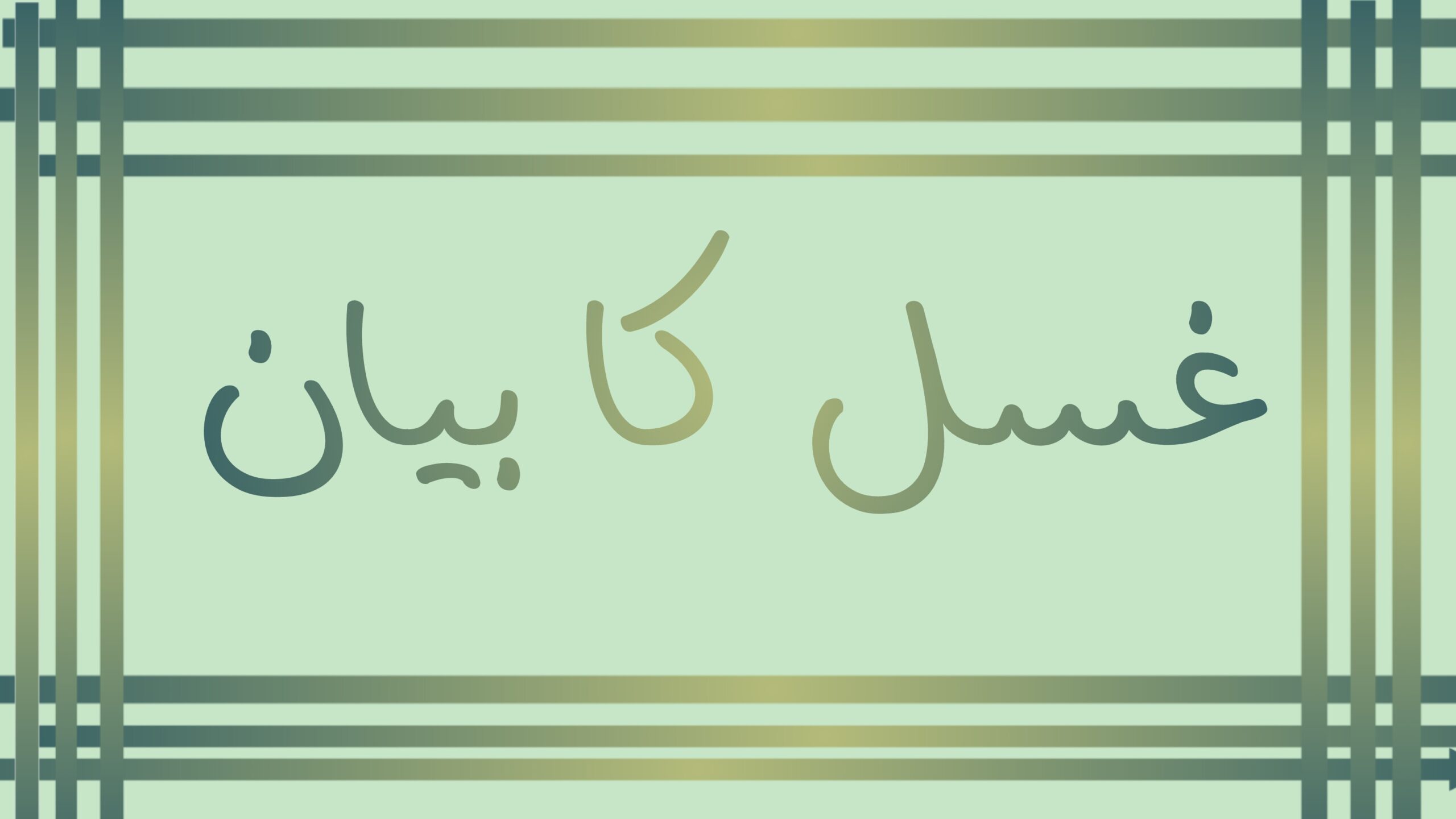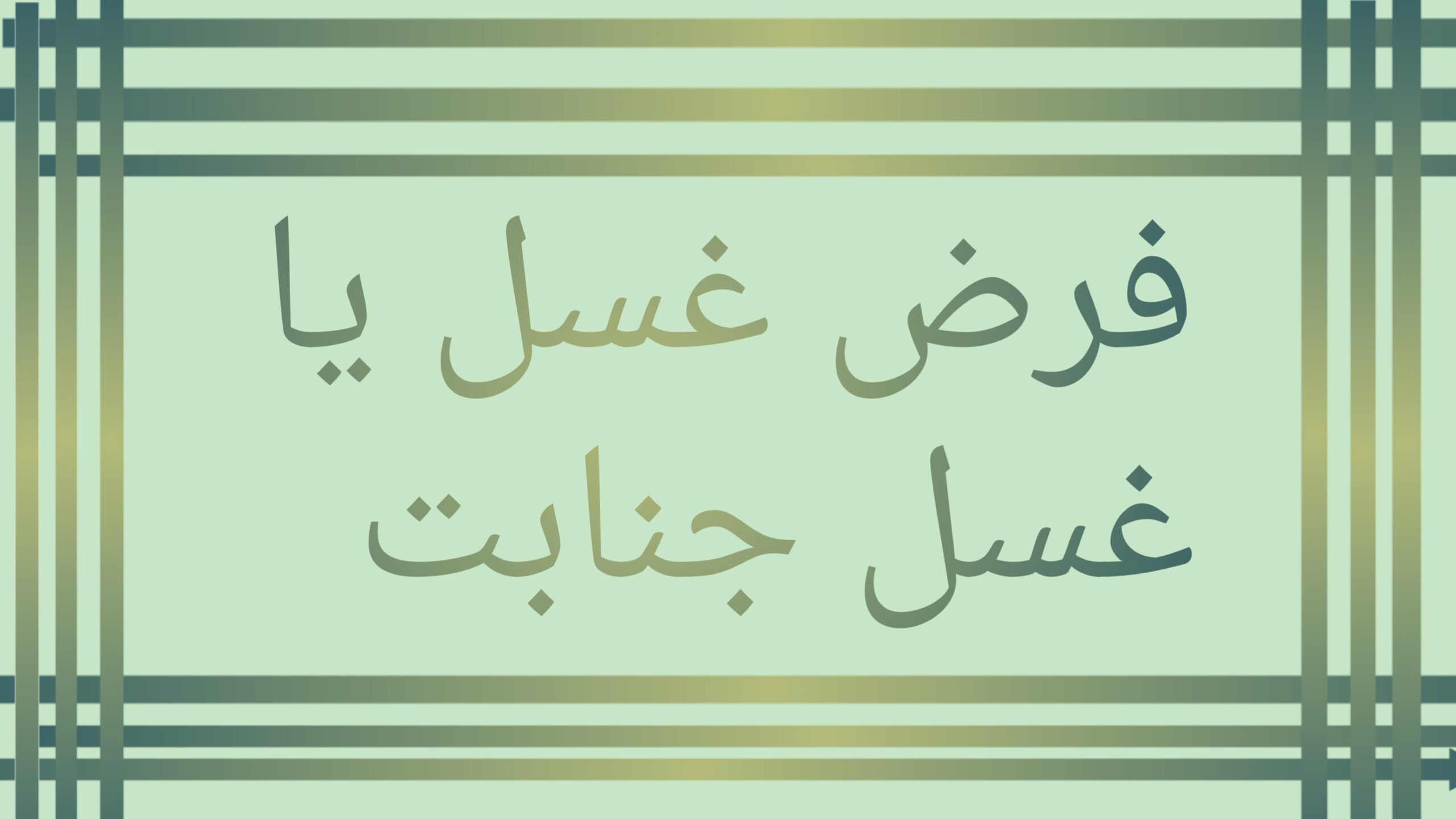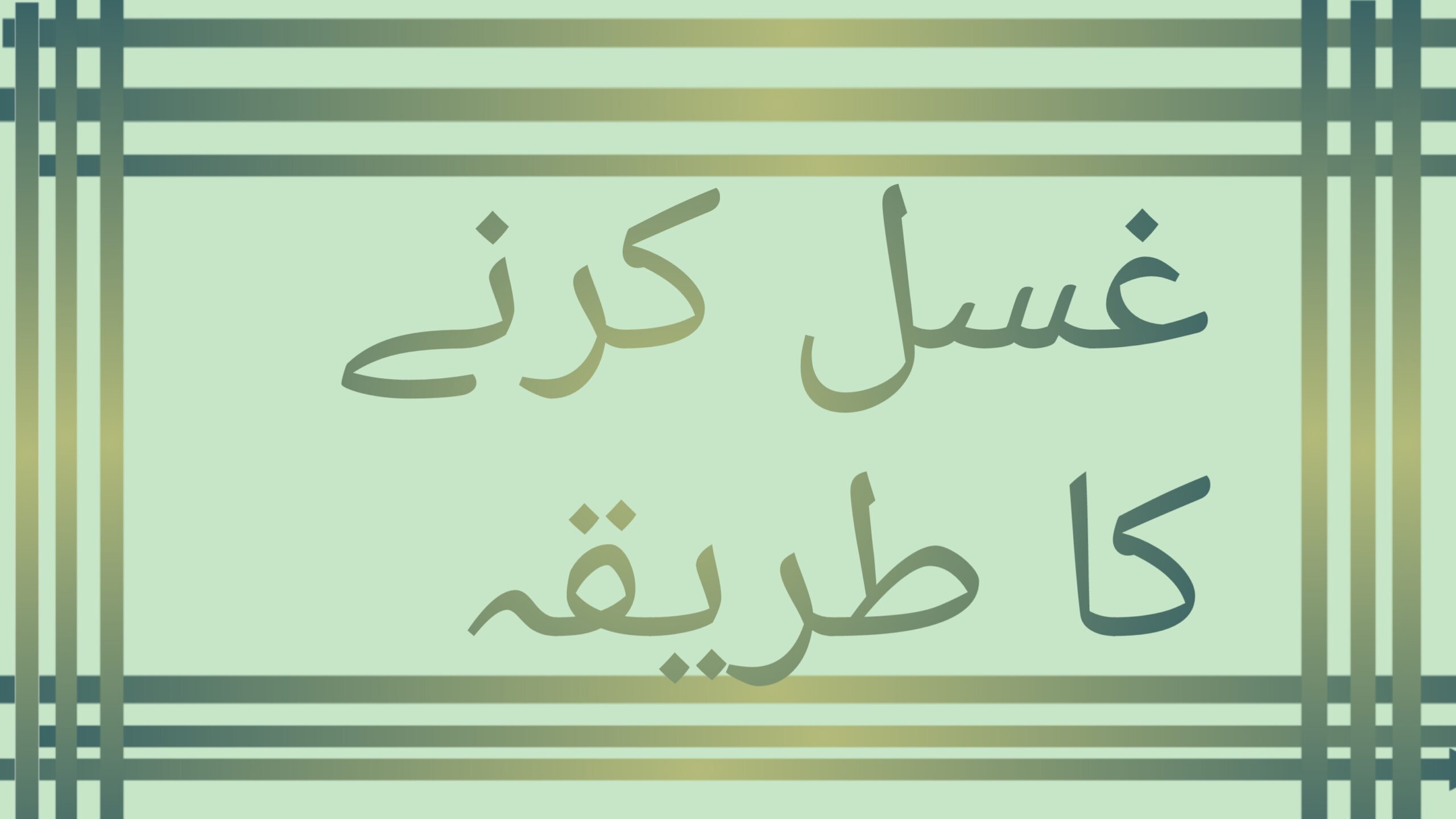غسل کا بیان5Description of Ghusl (Ritual Purification) right now right way
غسل کا بیان
قرآن مجید میں ارشاد الہی ہے۔ وان كُنتُمْ جُنُباً فَاطْهَرُوا (اگر تم ، پاک ہوتو خوب طہارت حاصل کرو) اسلام نے طہارت پر بہت توجہ دی ہے کیونکہ فطری طور پر جسم اور ماحولکی پاکیزگی انسان کی روح پر اثر انداز ہوتی ہے۔
فرض غسل یا غسل جنابت
لغت میں غسل کے معنی سارے بدن کو دھونے کے ہیں لیکن شریعت کی اصطلاء میں سر سے پاؤں تک جسم کے ان تمام حصوں کو دھونے کو غسل کہتے ہیں۔ جن تک پانی پہنچانا بغیر کسی تکلیف کے ممکن ہو۔ غسل کرنا یوں تو جسم کی صفائی کے لحاظ سے ایک اچھا عمل ہے لیکن بعض صورتوں میں شریعت کے نزدیک غسل کرنا فرض ہو جاتا ہے۔ جب تک غسل نہ کرے انسان کو نا پاک رہتا ہے۔ ایسے غسل کو غسل جنابت کہتے ہیں۔ جن صورتوں میں غسل کرنا فرض ہو جاتا ہے۔
صحبت اور غسل جنابت
ایک مرتبہ صحابہ کرام کے درمیان غسل جنابت کا مسئلہ زیر بحث آیا۔ ایک گروہ کہتا۔ تھا کہ غسل صرف دخول پر فرض ہو جاتا ہے انزال شرط نہیں ۔ دوسرا گروہ بیان کرتا تھا کہ وجوب غسل کے لیے دخول کے ساتھ انزال بھی شرط ہے۔ یہ طویل مباحثہ کسی فیصلہ کن نتیجے پر نہ پہنچ سکا۔ آخر کار سیدنا ابو موسیٰ اشعری نے اس مسئلے کے حل کی ذمے داری لی ، انھوں نے ام المومنین عائشہ سے اس بارے میں دریافت کیا، عائشہ نے کہا کہ رسول اللہ صلی اللہ علیہ وسلم نے فرمایا
:
إِذَا جَلَسَ بَيْنَ شُعَبِهَا الْأَرْبَعِ وَمَسَّ الْخِتَانُ الْخِتَانَ فَقَدْ وَجَبَ الْغُسْلُ
” جب مرد، عورت کی چار شاخوں کے درمیان بیٹھ جائے اور اس کا محل ختنہ عورت کے محل ختنہ کے ساتھ مس کرے تو غسل واجب ہو جاتا ہے۔ تو مسئلہ یہ ثابت ہوا کہ صرف دخول پر مرد اور عورت جنبی ہو جاتے ہیں اور ان پر غسل رسول اللہ نے فرمایا: ” جب مرد، عورت کی چار شاخوں کے درمیان بیٹھ کر صحبت
کرے تو غسل واجب ہو گیا ، اگر چہ منی نہ نکلے ۔
غسل جنابت کا طریقہ
Description of Ghusl (Ritual Purification)
The Qur’an mentions: “And if you are in a state of janabah (impurity), then purify yourselves.” (Al-Ma’idah, 5:6). Islam places great emphasis on purity because, naturally, the cleanliness of the body and surroundings has a profound impact on the soul.
Obligatory Ghusl (Ghusl Janabah)
In linguistic terms, ghusl refers to washing the entire body. In Islamic jurisprudence, it refers to washing all parts of the body from head to toe, provided water can reach them without difficulty. While ghusl is generally a beneficial act of cleanliness, there are specific circumstances in which it becomes obligatory. A person remains in a state of impurity until they perform ghusl. This obligatory ghusl is known as ghusl janabah, and it is required in certain situations.
میمونہ بیان کرتی ہیں کہ رسول اللہ ﷺ نے غسل کا ارادہ فرمایا تو سب سے پہلے دائیں ہاتھ سے بائیں ہاتھ پر پانی ڈال کر دونوں ہاتھ دھوئے، پھر دائیں کے ساتھ بائیں کی پانی ڈالتے ہوئے شرمگاہ کو دھویا، پھر بایاں ہاتھ، جس سے شرمگاہ کو دھویا تھا، زمین پر رگڑا ہے پر اسے دھویا ، پھر کلی کی اور ناک میں پانی ڈالا، پھر چہرہ دھویا، پھر کہنیوں سمیت ہاتھ دھوئے، پھر تین بار سر پر پانی ڈالا اور بالوں کی جڑوں تک پانی پہنچایا، پھر تمام بدن پر پانی ڈالا،پھر
جہاں آپ نے غسل کیا تھا اس جگہ سے ہٹ کر پاؤں دھوئے ۔ حافظ ابن حجر فرماتے ہیں: کسی حدیث میں (غسل جنابت کا وضو کرتے وقت) سر کے مسح کا ذکر نہیں ہے۔
عائشہ اور عبد اللہ بن عمر بن رسول اللہﷺ کے غسل جنابت میں وضو کا ذکر کرتے ہوئے فرماتے ہیں کہ آپ نے سر کا مسح نہیں کیا بلکہ اس پر پانی ڈالا ۔ امام نسائی نے اس پر یہ حدیث بیان کی ہے : ” جنابت کے وضو میں سر کا مسح ترک کرنا ۔
آبادی میں غسل کرتے وقت پردے کا اہتمام کرنا ضروری ہے۔ تنبیہ نماز کے لیے غسل جنابت کا وضو کافی ہے۔
دیگر غسل
غسل جنابت کے بعد اب ان احوال کا ذکر کیا جا رہا ہے جن میں غسل کرنا واجب، مسنون یا مستحب ہے۔
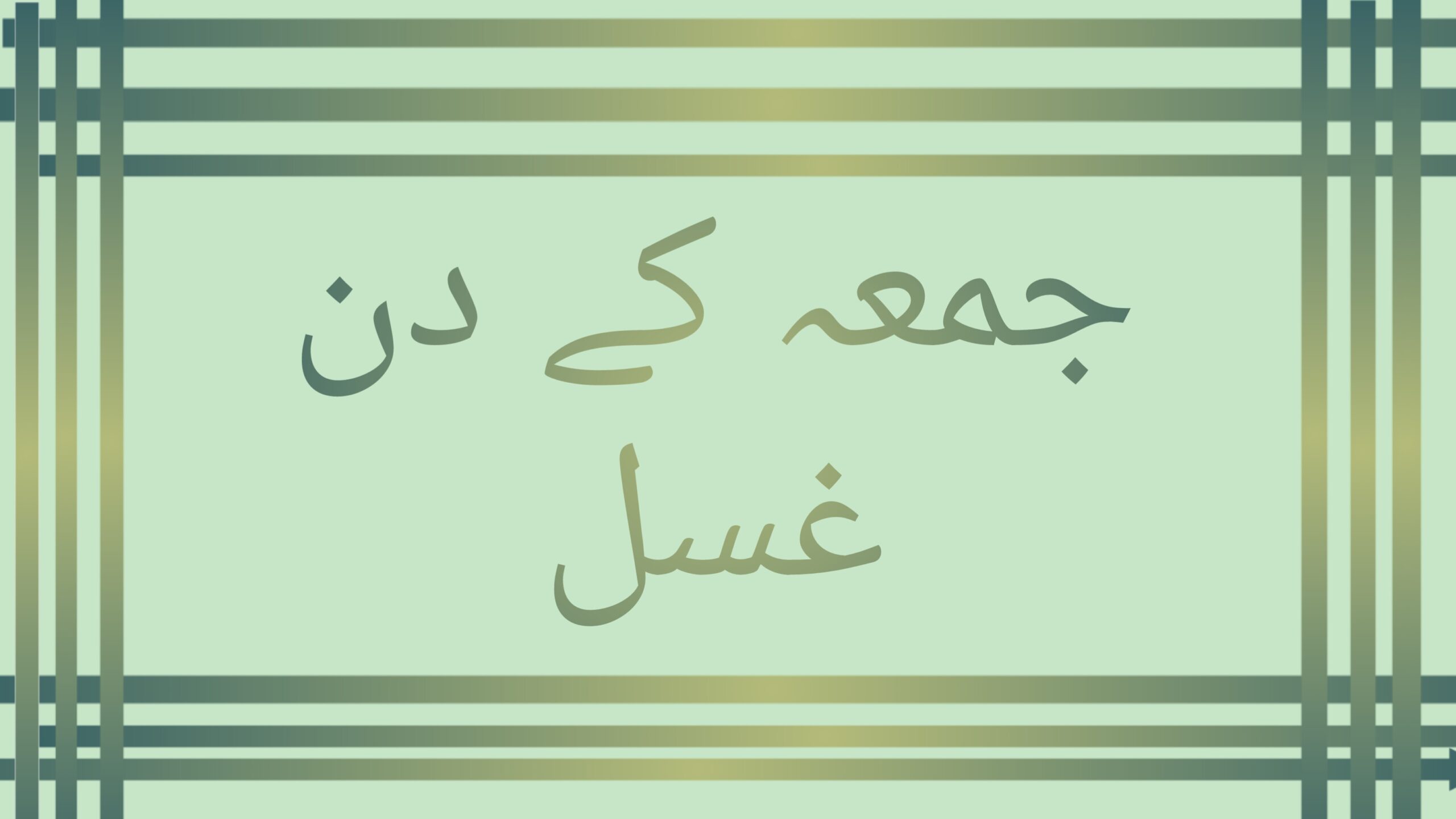
جمعہ کے دن غسل:ابن عمر سے روایت ہے کہ رسول اللہﷺ نے فرمایا:
إِذَا جَاءَ أَحَدُكُمُ الْجُمُعَةَ فَلْيَغْتَسِلْ»
جب تم میں سے کوئی شخص نماز جمعہ کے لیے آئے تو وہ غسل کرے۔
سیدنا ابو ہریرہ بنی اللہ سے روایت ہے کہ رسول اللہ ﷺ نے فرمایا: ” ہر مسلمان پر حق ہے۔
ہفتے میں ایک دن ( جمعے کو غسل کرے۔ اس میں سر اور اپنا بدن دھوئے ۔ سیدنا ابو سعید خدری جی کہتے ہیں کہ رسول اللہ صلی ہم نے فرمایا: ” جمعے کے دن ہر بالغمسلمان پر نہانا واجب ہے۔“ ابن جوزی فرماتے ہیں: جمعے کے دن غسل کرنا واجب ہے کیونکہ اس کی احادیث زیادہ صحیح اور قوی ہیں۔ ابن حزم اور علامہ شوکانی نے بھی اس مذہب کو اختیار کیا ہے۔
میت کو غسل دینے والا غسل کرے
سیدنا ابو ہریرہ روایت کرتے ہیں کہ رسول اللہ ﷺ نے فرمایا: ” جو شخص میت کو غسل دے اسے چاہیے کہ وہ خود بھی نہائے ۔ ابن عمر بھی فرماتے ہیں : ہم میت کو غسل دیتے، پھر ہم میں سے بعض غسل کرتے اور بعض نہ کرتے ۔
دونوں احادیث کو ملانے سے مسئلہ یہ ثابت ہوا کہ جو شخص میت کو غسل دے، اس کے لیے نہانا مستحب ہے ، ضروری نہیں۔
نو مسلم کے لیے غسل:
سید نا قیس بن عاصم سے روایت ہے کہ جب وہ مسلمان ہوئے تو رسول اللہ ﷺ نے انھیں حکم دیا کہ وہ پانی اور بیری کے پتوں سے غسل کریں ۔
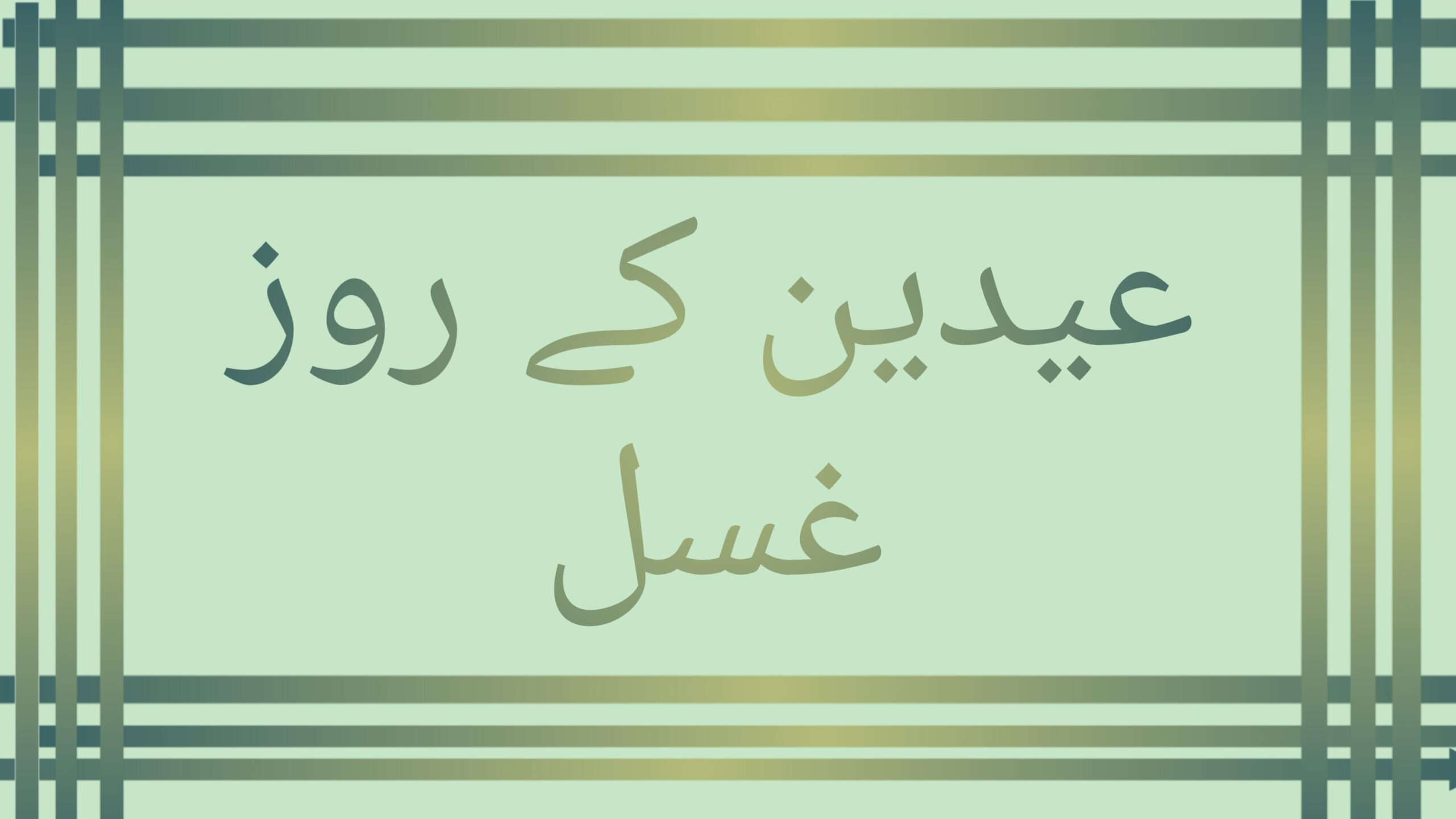
عیدین کے روز غسل
نافع کہتے ہیں کہ سیدنا ابن عمر عیدالفطر کے روز عید گاہ جانے سے پہلے غسل کیا کرتے تھے۔ سیدنا علی نے فرمایا: جمعہ، عرفہ، قربانی اور عید الفطر کے دن غسل کرنا چاہیے۔ یہ عیدین کے روز غسل پر سب سے اچھی دلیل ہے۔ امام نووی فرماتے ہیں : اس مسئلے میں اعتماد سید نا عبداللہ بن عمر اثر پر ہے، نیز اس کی بنیاد جمعے کے غسل پر قیاس ہے۔
The Issue of Intimacy and Ghusl Janabah
Once, the companions of the Prophet discussed the issue of ghusl after intimacy. One group argued that ghusl becomes obligatory only after penetration, while another group maintained that it is only obligatory if both penetration and ejaculation occur. The debate did not lead to a clear conclusion. Eventually, Sayyidina Abu Musa Ash’ari took the responsibility to resolve the matter and asked Umm al-Mu’minin Aisha (RA) about it. She responded that the Prophet (PBUH) said:
“When a man sits between the four parts of a woman’s body and his circumcised part touches hers, ghusl becomes obligatory.” (Sahih Muslim)
This hadith clarified that ghusl becomes obligatory after penetration, whether or not ejaculation occurs.
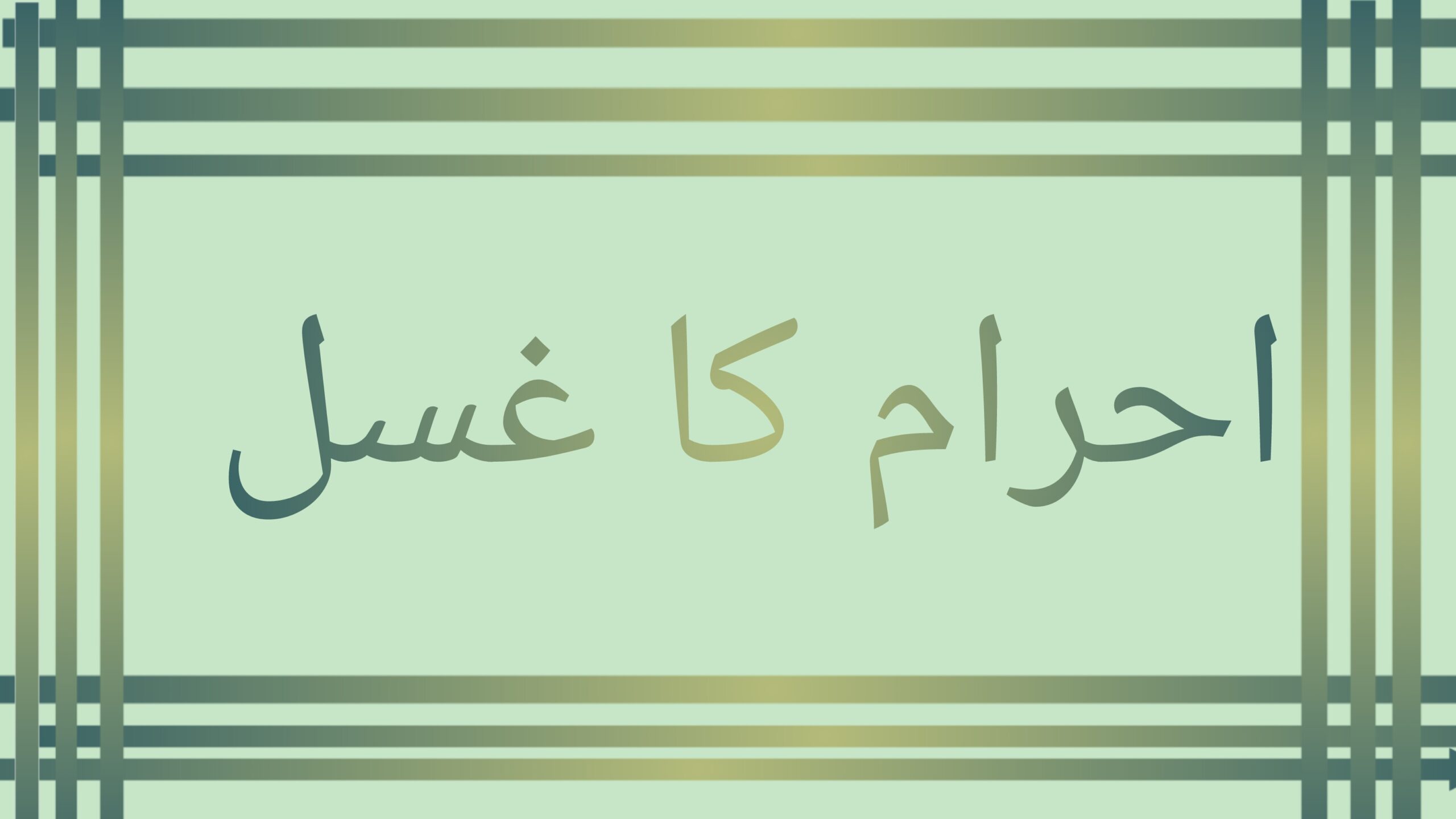
احرام کا غسل
سیدنا زید بن ثابت سے روایت ہے کہ حج کا احرام باندھتے وقت رسول اللہ ﷺ نے غسل فرمایا۔
غسل کرنے کا طریقہ
غسل کرنے کیلئے پہلے دونوں گٹوں تک ہاتھ دھو لیں ۔ اس کے بعد استنجاء کریں خواہ استنجاء کے مقام پر نجاست لگی ہو یا نہ لگی ہو اور پھر بدن پر جس جگہ نا پا کی لگی ہوئی ہو اس کو صاف کریں۔ پھر دونوں ہاتھوں کو اچھی طرح صابن وغیرہ سے دھو کر جس طرح نماز کے لیے وضو کرتے ۔ ہیں اسی طرح وضو کریں اور وضو کرتے وقت منہ بھر کر کلی کریں اگر روزہ نہ ہو تو غرارہ بھی کریں
اور ناک میں خوب خیال کے ساتھ پانی چڑھائیں یاد رہے کہ ناک کے دونوں نتھنوں کا نرم حصہ دھل جانا ضروری ہے۔ اگر آپ پتھر یا چوکی یا ایسے پکے فرش پر بیٹھے غسل کر رہے ہیں جہاں سے پانی فورا بہہ جاتا ہے تو دونوں پاؤں بھی اس وضو کے ساتھ دھولیں ورنہ پاؤں آخر میں دھوئیں اگر یہ غسل فرض ہو تو وضو میں بسم اللہ الرحمن الرحیم کے سوا اور کوئی دعا نہ پڑھے۔ پھر وضو کے بعد تمام بدن پر تھوڑا سا پانی ڈال کر خوب ملیں ۔ دوران غسل کسی سے کلام نہ کرے۔
اگر صابون استعمال کرنا چاہیں تو صابون بھی استعمال کریں۔ اس کے بعد تین مرتبہ سارے بدن پر پانی بہائیں یہ خیال کے رہے کہ کوئی جگہ خشک نہ رہ جائے اگر بال کے برابر بھی کوئی جگہ خشک رہ جائے تو غسل نہ ہوگا۔

غسل کے مسائل
سر کے بال اگر گندھے ہوئے نہ ہوں تو تمام بالوں کی نوک سے جڑ تک پانی بہانا فرض ہے اور اگر گندھے ہوئے ہوں تو مرد پر فرض ہے کہ انہیں کھول کر نوک سے جڑ تک پانی بہائے اور عورت کیلئے چوٹی کھولنا ضروری نہیں صرف بالوں کی جڑوں تک پانی پہنچانا کافی ہے۔
اگر کسی عضو پر زخم ہو یا پانی بہانا نقصان دہ ہو تو اس پورے عضو کا مسح کر لینا چاہیے۔ اگر زخم پر پٹی ہو تو صرف پٹی کا ہی مسح کافی ہو گا مسح کا طریقہ یہ ہے کہ ہاتھ پانی سے دھو کر جھٹک دیں اور پھر انہیں پٹی پر پھیر دیں۔
اگر کوئی شخص غسل فرض میں کلی کرنا یا ناک میں پانی ڈالنا بھول گیا یا جسم کا کوئی حصہ خواہ وہ بال برابر ہی ہو دھلنے سے رہ گیا تو غسل نہ ہو گا ۔ اس صورت میں از سر نو غسل کی ضرورت نہیں ہے بلکہ جو چیز جس میں ادا کرنا بھول گیا ہے اس کو ادا کر لے مثلا کلی کرنا بھول گیا تو اب کلی کر لے غسل درست ہو جائے گا۔
غسل کا بیان5Description of Ghusl (Ritual Purification) right now right way
Method of Performing Ghusl Janabah
Sayyidah Maymunah (RA) narrates that when the Prophet (PBUH) intended to perform ghusl, he would begin by washing his hands, first with his right hand and then with his left, followed by washing his private parts with water. He would then rub his left hand on the ground and wash it. Next, he would perform a mouth rinse (gargle) and rinse his nostrils, followed by washing his face. Then, he would wash his arms up to the elbows, pour water over his head three times, ensuring the water reached the roots of his hair, and then wash the rest of his body. Finally, he would wash his feet away from the place where he performed ghusl.
Imam Ibn Hajar notes that there is no mention of wiping the head in ghusl janabah in any hadith. Aisha and Abdullah bin Umar (RA) specifically mention that the Prophet (PBUH) did not wipe his head but poured water over it. Imam Nasai narrated this hadith, saying: “It is not necessary to wipe the head during the ghusl after janabah.”
It is important to observe modesty while performing ghusl in public places, and note that ghusl after janabah is sufficient for prayer.
Other Types of Ghusl
After discussing ghusl janabah, we now look at other instances where ghusl is obligatory, recommended, or desirable.
1. Ghusl on Fridays: Ibn Umar (RA) narrated that the Prophet (PBUH) said: “When any one of you comes to the Friday prayer, he should take a bath.” (Sahih Bukhari)
Sayyidina Abu Huraira (RA) narrated: “It is obligatory for every Muslim to take a bath on Friday, washing his head and body.” The scholars agree that ghusl on Fridays is obligatory for men, as the hadiths supporting it are strong and numerous.
2. Ghusl for Washing the Deceased: Abu Huraira (RA) narrates that the Prophet (PBUH) said: “Whoever gives ghusl to the deceased should perform ghusl himself.” Ibn Umar (RA) also mentioned that they would give ghusl to the deceased and some of them would perform ghusl while others would not. Therefore, it is recommended for the person giving ghusl to the deceased to also perform ghusl, although it is not obligatory.
3. Ghusl for New Muslims: Qais bin Asim (RA) narrates that when he converted to Islam, the Prophet (PBUH) instructed him to perform ghusl using water and leaves from the bidara tree.
4. Ghusl on Eid Days: Nafi’ (RA) reports that Sayyidina Ibn Umar (RA) would perform ghusl before going to the Eid prayer. Sayyidina Ali (RA) also stated that ghusl on Eid al-Fitr, Eid al-Adha, and the day of Arafah is recommended. Imam Nawawi emphasizes this practice based on the narrations of Abdullah bin Umar (RA), drawing an analogy to the ghusl for Friday prayers.
5. Ghusl for Ihram: Zaid bin Thabit (RA) narrates that the Prophet (PBUH) performed ghusl when he was about to enter the state of Ihram for Hajj.
How to Perform Ghusl
To perform ghusl, first wash your hands up to the elbows. Afterward, cleanse the private parts, whether or not impurity is visible. Then, perform istinja (cleaning after relieving oneself), ensuring to clean any area of the body that has been soiled. Next, perform wudu (ablution) as you would for prayer, ensuring to gargle and rinse the nose if you are not fasting. If you are not sitting on a surface where water drains away quickly, ensure to wash both feet during wudu or at the end of ghusl. After wudu, pour water over the entire body, making sure no part of the body remains dry.
It is important to note that using soap is permissible during ghusl. After this, pour water over the body three times, ensuring no part remains dry. If any part, even the size of a hair, remains dry, the ghusl will not be valid.
Issues Related to Ghusl
Washing Hair: If the hair is not tangled, it is obligatory to pour water over all strands, from root to tip. If the hair is tangled, men must untangle it to ensure water reaches the roots. Women do not need to untangle their hair; it is sufficient for water to reach the roots.
Wounds or Injuries: If a person has a wound or injury where washing would be harmful, they should wipe over the wound instead of washing it. If there is a bandage on the wound, wiping over the bandage is sufficient.
Omissions in Ghusl: If a person forgets to rinse the mouth or nose, or if any part of the body, even a small area, is missed during ghusl, the ghusl is invalid. In such a case, the person should perform the missed action (e.g., rinse the mouth or wash the missed part) to correct the ghusl.



